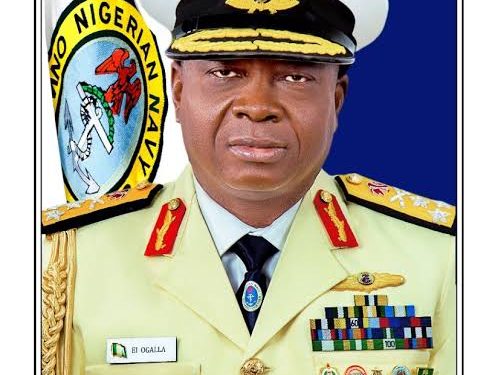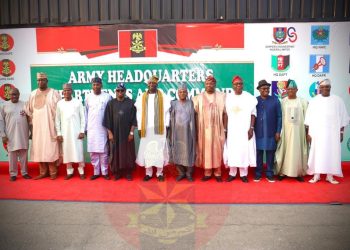By Nkechi Eze, Abuja
The Nigerian Navy (NN) has announced sweeping operational achievements over the past two years, with an aggressive campaign against oil theft, piracy, sea robbery, and smuggling, which led to the interception of goods worth over ₦34.5 billion and a marked improvement in national and regional maritime security.
This was revealed at the Expanded Defence Headquarters Media Chat held in Abuja, where Rear Admiral Olusegun Olukunle Soyemi, Director Navy Operations, delivered a detailed briefing on behalf of the Chief of Naval the Staff (CNS), Vice Admiral Emmanuel Ogalla. The report covered the Navy’s achievements from June 2023 to June 2025, outlining the Navy’s tactical responses to maritime threats, asset acquisitions, international collaborations, and its future initiatives.
Rear Admiral Soyemi emphasized that the Navy has remained resolute in guaranteeing the freedom of the seas, safeguarding Nigeria’s maritime interests, and advancing national economic prosperity. Central to this success has been the effective execution of operations targeting piracy, oil theft, smuggling, and maritime-related crimes.
Since assuming office in June 2023, the Chief of Naval Staff has strengthened the Navy’s footprint through consistent presence at sea, resulting in zero piracy incidents in Nigerian waters since March 3, 2022, a landmark achievement that sustained Nigeria’s removal from the list of piracy-prone countries.
One of the Navy’s most notable efforts is Operation Delta Sanity, initially launched in January 2024 and overhauled in December of the same year to integrate aerial surveillance and improved intelligence. The result has been the arrest of 76 vessels and 242 suspects, alongside the deactivation of 808 illegal refining sites, 2,411 dug-out pits, and 5,421 illegal storage facilities. These actions denied criminals access to 27,255,505 litres of crude oil (171,418 barrels), 4,017,262 litres of illegally refined diesel (AGO), 117,525 litres of Dual Purpose Kerosene (DPK), and 369,155 litres of Premium Motor Spirit (PMS), collectively valued at approximately ₦29.5 billion.
The Navy’s anti-smuggling efforts have also recorded remarkable success. Over the last two years, 4,610 bags of foreign parboiled rice, 1,467 bags of Cannabis Sativa, and other psychoactive substances smuggled via wooden boats were intercepted, all valued at more than ₦5 billion.
In support of national military operations, over 1,800 Nigerian Navy personnel including Special Boat Service (SBS) and Special Forces detachments were deployed across nine Defence Headquarters-led Internal Security (IS) operations such as Operations Hadin Kai (OPHK), Safe Haven (OPSH), Delta Safe (OPDS), Forest Yaji (OPFY), and Whirl Stroke (OPWS). These deployments, covering all six geopolitical zones, ensured that maritime and coastal components supported joint and independent security missions across land and sea.
The Navy’s responsiveness was also demonstrated in humanitarian missions such as Operation Flood Sanity in Borno State, following devastating floods, and Operation Lake Sanity in Darak, Cameroon, which reaffirmed the Navy’s regional humanitarian and peacekeeping role. Furthermore, in April 2025, the Navy operationalized a new Naval Outpost in Shagunu, situated along the River Niger axis in Niger and Kebbi States to intercept bandits and disrupt arms smuggling routes.
In a move to strengthen capability, the Navy engaged in asset recapitalization, acquiring several new maritime assets in the last two years. These include three patrol ships, NNS IKOGOSI, NNS FARO, and NNS SHERE and three AW139 helicopters, which were officially commissioned on May 31, 2025, by the Honourable Minister of State for Defence, Dr. Bello Matawalle, as part of the Navy’s 69th Anniversary celebrations. The Navy has also made significant progress in indigenous shipbuilding, reaching an advanced stage in constructing Seaward Defence Boats IV and V at the Naval Dockyard Limited (NDL).
Recognizing the complexity of emerging threats, the Navy established several new bases and commands to address security gaps. These include the NNS MADUEKE, commissioned in May 2024 to strengthen security in the Southeast, and the creation of the Nigerian Navy Marines (NNM) as a rapid-response force for internal security and riverine operations. In April 2025, the Navy also launched a Special Operations Command to centralize the NNM, SBS, Special Forces, and Explosive Ordnance Disposal (EOD) teams, improving the coordination of land-centric operations.
Hydrographic capability was another major focus. The Navy’s hydrographic ships conducted extensive surveys that led to the production of updated navigational charts and maritime publications. A notable milestone was the deployment of NNS OCHUZO in December 2024 to carry out hydrographic surveys in the Bakassi Deep Sea Port area in partnership with the Cross River State Government. The survey will support the development of a proposed 20-metre-deep seaport aimed at boosting shipping in Nigeria’s eastern corridor.
Rear Admiral Soyemi highlighted that international and regional cooperation has remained a central pillar of the Navy’s strategy. Under the Yaoundé Code of Conduct of 2013, the Navy enhanced information-sharing with navies from ECOWAS and ECCAS countries. Nigeria also hosted warships from partners including the United States, United Kingdom, India, Brazil, and Spain, conducting joint patrols and naval exercises that deepened capacity-building and strengthened Gulf of Guinea maritime security. The Federal Government also signed an MoU with the African Union (AU) enabling the Nigerian Navy to provide strategic sealift support across the African maritime domain. Plans are underway to operationalize a Combined Maritime Task Force under the AU for enhanced regional maritime coordination.
Looking ahead, the Navy plans to acquire additional frigates, offshore patrol vessels, drones, fast patrol boats, tugboats, and combat helicopters to augment operational efficiency. The expected delivery of two 76-meter High Endurance Offshore Patrol Vessels from Turkey’s Dearsan Shipyard will support long-range patrols within the Gulf of Guinea and beyond. Furthermore, 20 new houseboats will be deployed to critical choke points in the Niger Delta to fortify waterway security.
In conclusion, Rear Admiral Soyemi affirmed that the Nigerian Navy has not only intensified its operational tempo but has also embraced technology, local capacity-building, and strategic collaboration to stay ahead of maritime threats. He reiterated the Navy’s unwavering commitment to protecting Nigeria’s maritime environment, enhancing economic resilience, and contributing to national development.
















